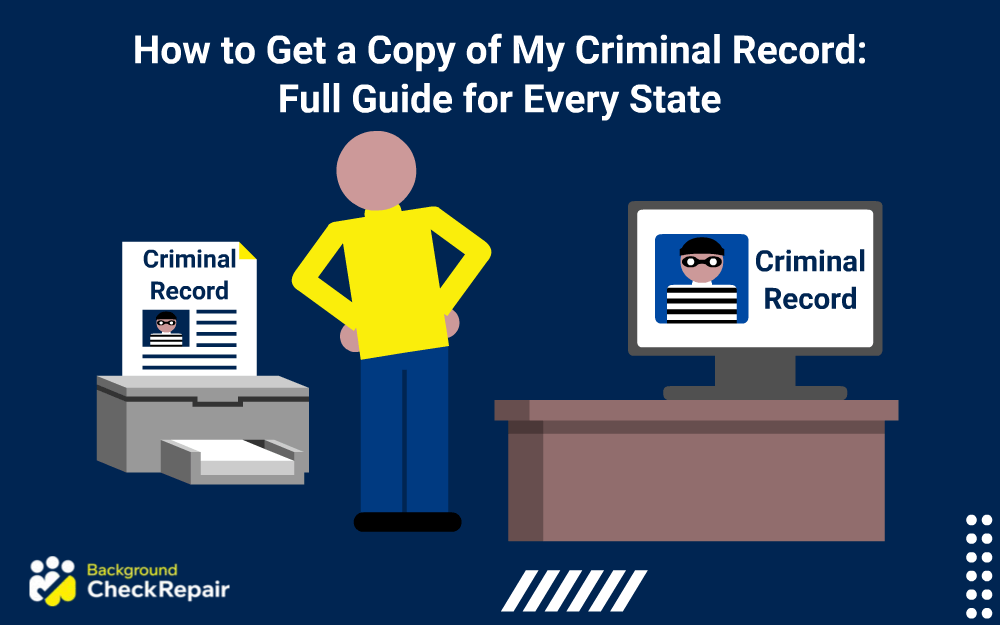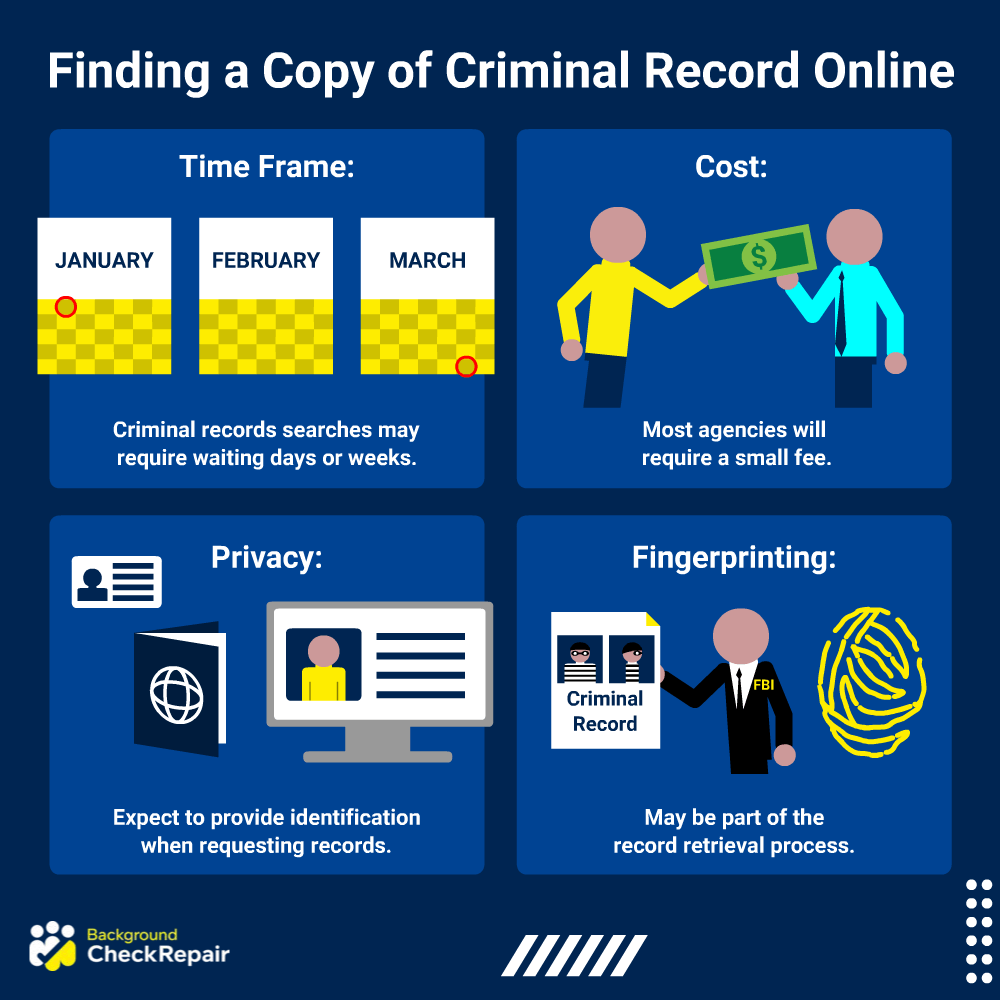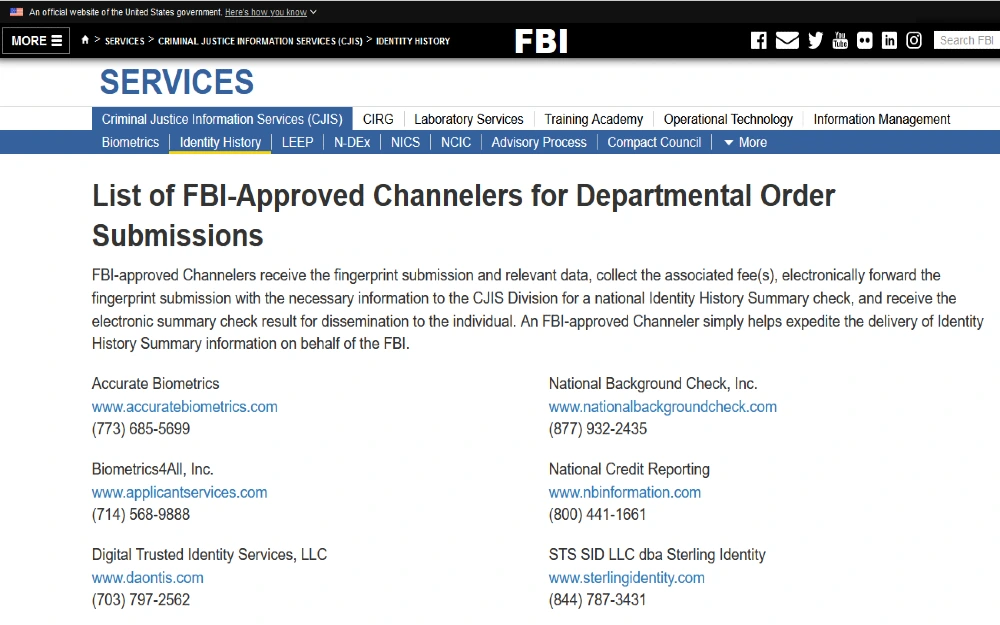
Whether it’s in anticipation of a job interview or for personal reasons, many people wonder “how to get a copy of my criminal record.”
Luckily, with more and more records being digitized, this is easier than ever and can often be achieved in minutes, no matter which state holds the public criminal record.
This full guide outlines the process of how to get a copy of a personal criminal record, for all 50 states.
Finding a Copy of Criminal Record Online
Finding a copy of a criminal record online is generally a very easy process. Just keep in mind that how to get a criminal record on yourself varies slightly from state to state, with some states having higher fees and additional requirements.

Usually, a specific government agency will be in charge of criminal records for the state and will have clear and specific guidelines as to who can obtain these records and how they are able to do so.
- Time frame: Keep in mind that depending on the jurisdiction, criminal records searches may require waiting days or weeks for certain agencies to track down the requested information and return it.
- Cost: Most agencies will also require a small fee, that is usually from $5 to $15, depending on the state and agency that is retrieving the records. Some records retrieval processes are free when doing a background check on yourself, but this is rare.
- Privacy: Due to laws surrounding who can request criminal record copies, individuals requesting their own records can expect to provide some kind of identification when requesting records.
- Fingerprinting: Some states require fingerprints as part of the record retrieval process, while others will allow a name-based search. For fingerprints, the individual is usually required to visit a registered state government fingerprinting service, and it can take longer than name-based searches.
Step 1: Access the Website of the Agency in Charge of Criminal Records
Every state has a slightly different system for keeping track of criminal records. Oftentimes these records will be held by either the state police department, or the state department of justice.
In some cases criminal records will be kept by the department of corrections as well, so the first step should be to identify which agency is in charge in the state where the criminal records are held.
A google search of: “[State] Criminal Records” should point to individuals of the proper agency that houses these records. There is also a table provided below with the websites of each state agency in charge of criminal records.
For example, criminal records in California are held by the California Department of Justice, so users will need to access the website of the California Attorney general, in order to make a request.
When wondering, “how to get a copy of my criminal record,” individuals need to find their documents and know what shows up on a criminal record. Once the proper website has been accessed, the next step is to learn more about the specific steps that the state requires for obtaining copies of criminal records. In some cases, this will be referred to as a RAP (Record of Arrests and Prosecutions) sheet.
However, there a number of terms uses on each website that indicate the section where record information is kept, such as:
- Criminal Records Requests
- RAP Sheet requests
- Public Records
- Criminal History Information
This is where individuals can find information on how to get a copy of my criminal record.
For example, in California, the homepage of the attorney general website has a section labeled simply as “records,” which can be found under the “resources,” drop down menu. This is where information on requesting public records, including criminal records can be found.
Step 3: Follow Specific Steps to Request Criminal Records
Once the information has been located, requesting records is as simple as following the specific guidelines laid out by the state.
There are usually a number of steps involved in the process beyond simply providing your name. Common steps and information that are required are:
- Disclaimer
- Basic identity information (Social security number, name, address, etc.)
- Processing Fee
- Reason for request
- Fingerprints
For example, in California, to request a copy of their criminal record the users must submit “livescan fingerprints,” (specific instructions for this are provided on the criminal records request information page).
Completing the fingerprinting through livescan will provide the state with all the information they need to process the request. The company that takes the fingerprints will send them to the proper agency on behalf of the individual. From there the request will be processed and the copy of the criminal record will be sent to the address provided.
Keep in mind that many states have slightly different steps for out of state residents requesting a copy of their criminal records.
For example, residents outside of California requesting California criminal records have to fill out a specific application and mail manual fingerprint cards to the California Department of Justice. The records request information page has detailed steps on how to do this.
Links to the government agency in charge of background checks and criminal record copies in each state can be found below.
Look Up a Copy of My Federal Criminal Record
For those trying to figure out ‘how to get a copy of my criminal record,’ who have been convicted of federal crimes, the process is slightly different. Rather than go through a state agency, individuals seeking federal criminal records will need to obtain these documents through the FBI.
As is the case with many of the state criminal records, obtaining a federal criminal record from the FBI (Also known as a Identity History Summary) requires fingerprints be submitted.
Detailed steps on how to obtain a federal criminal record are outlined below. Keep in mind that an FBI background check is an additional layer of background searches and has additional steps that are not included in performaing a federal background check on yourself.
Step 1: Access the Identity History Summary Checks page on the FBI Website.
Information on how to obtain a criminal record from the FBI can be found on the Identity History Summary Checks page on their website.
To access this page, simply navigate to the “services” link on the homepage of the FBI website and select the IHSC (Identity History Summary Checks) page.

The Federal Bureau of Investigation keeps criminal records for every state, as well as federal crimes, and the website explains how to get a copy of my criminal record.
Step 2: Decide Which Method To Use
The FBI lays out three different methods to obtain an identity history summary check from the FBI. The options are:
- Submit a request electronically
- Submit a request by mail
- Submit a request through an FBI-approved channeler
Step 3: Submit an IHSC Request
Once the individual has made the decision as to which option works the best for them the only thing left to do is to follow the individual steps. Each option requires much of the same information and fingerprints.
Option 1: Submit a Request Electronically
Submitting a request electronically is both the easiest and quickest way for most individuals. The first step is to access the Electronic Departmental order portal and enter in an email address to begin the application process.
From here, the onscreen prompts will guide users through the bulk of the process. Completion of an application form, fingerprints and payment are all required to obtain the criminal records.
The FBI suggests visiting the local United States Post Office to obtain the required fingerprints that will be sent to the FBI. More detailed information is available when the process is started.
The process for an electronic request should only take a few weeks, but can be longer in some cases. Once the request has been completed and submitted, the FBI provides a way to check the progress of the application, so that individuals know when to expect their results by mail.
Option 2: Submit a Request by Mail
Submitting a criminal record request by mail requires much of the same information as the online request, however it is important to be careful when gathering this information in order to avoid delaying the process if an important document was not mailed correctly.
The individual will still need to fill out the proper application form provided by the FBI before continuing to the fingerprinting step. Once the form has been completed, the individual will need to obtain fingerprints through an authorized fingerprinting service and do so on an authorized fingerprint form.
Finally, the proper payment in the form of a money order or certified check must also be included when the completed documents are mailed. There is also an option to pay for the application with a credit card by completing a credit card payment form that is provided on the website.
Once all the necessary documents and applications have been filled out, mail all of the documents to the FBI at the following address:
FBI CJIS Division – Summary Request
1000 Custer Hollow Road
Clarksburg, WV 26306
Option 3: Submit a Request Through an FBI-Approved Channeler
Steps to submit a request through an FBI-channeler will be provided by the third party company. The company will gather all the required information from the individual and submit it to the FBI on their behalf. The results will then be sent to the individual as normal.
A list of approved FBI-Channelers can be found here.

The FBI lists the approved channelers on it’s website, and these companies and agencies are able to assist the criminal records search process.
Understanding Criminal Record and Criminal Background Check Definitions and Terms
Some of the terms included in criminal records and criminal background check information can be confusing and in some cases will use acronyms that are not widely known.
- Conviction – A conviction happens when someone is found guilty of a crime, both felonies and misdemeanors, in court. This happens when the individual pleads guilty, or is found guilty by the jury after a trial has taken place.
- Indictment – An indictment is a formal charge for a crime. When someone commits a crime, in some cases a Grand Jury will decide to indict that person. This means that based on the evidence presented to the grand jury, there is evidence that a crime may have taken place. An indictment does not mean that a person is guilty, only that there is evidence that they may have committed a crime.
- Expungement – Expungement is when certain criminal records are removed from a criminal record. This may be done for a variety of reasons such as the person being a juvenile at the time or the charges were brought by mistake, such as mistaken identity.
- RAP Sheet – RAP sheets stands for “Record of Arrests and Prosecutions,” this is commonly used interchangeably with criminal record, or criminal history information.
- Criminal Record – A criminal record is a document that contains information for any law enforcement related records a person has. This includes arrest records, arrests without convictions and other related information.
- IHSC – IHSC stands for Identity History Summary Check. An IHSC is the same as a criminal record or rap sheet, only this term is specific to the FBI. However, the information is the same as a Rap sheet, only it includes federal records exclusively.
Benefits of Getting Criminal Record Copy
There are several benefits to getting a criminal record copy. The most common benefit is the ability to know what will show up on a background check.
Records are also useful for individuals who are hoping to expunge records, as well as those who wish to keep a copy so that they can easily keep track of the conditions of their probation or parole.
In fact, it’s even possible to get a no-cost criminal background check using the correct methods (like taking advantage of a weeklong free trial background check).
Simply put, knowing how to do your own background check can save hours of time and countless missed opportunities, false accusations, and incorrect accusations. There are many stories of innocent people having their records incorrectly altered (or being charged with a crime without knowing).
How Do I Erase My Criminal Record?
In some cases after figuring out how to get a copy of my criminal record, there may be information on it that is incorrect.
Some, but not all, criminal records can be erased. To better understand what records can be erased or expunged, the best thing to do is to talk to a criminal lawyer, who will have a better understanding of the legal system and what can be removed.
One thing that should always be able to be removed is criminal records that are incorrect, such as crimes that the individual did not commit. This can be caused by data entry errors, incorrect social security numbers, etc.
In order to get an incorrect record expunged, the individual should contact the agency responsible for the criminal record check. The steps for each state vary slightly but in general the steps are the same.
- Contact the agency that supplied the record
- Obtain other records (Such as court hearings etc.) as proof of the incorrect records
- Provide the proof directly to the agency responsible for the error.
In most states there are specific laws around incorrect records that the agencies must follow, as well as time frames to prevent the individual from losing out on opportunity due to incorrect records.
These days, criminal records are incredibly important for employment and a host of other reasons. Although the process can be somewhat tedious, those wondering how to get a copy of my criminal record should be able to access their public records without difficulty.





